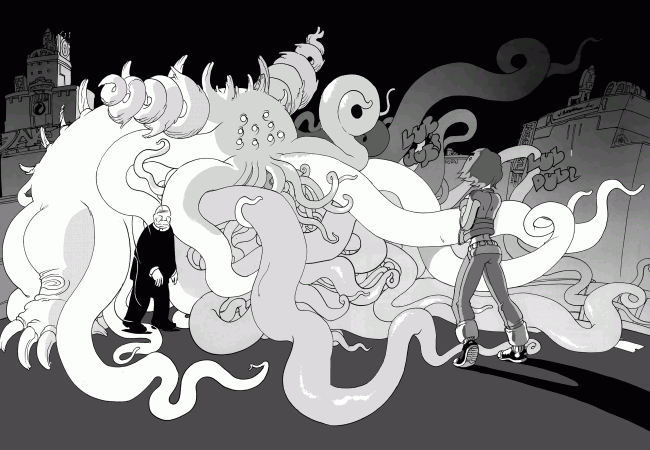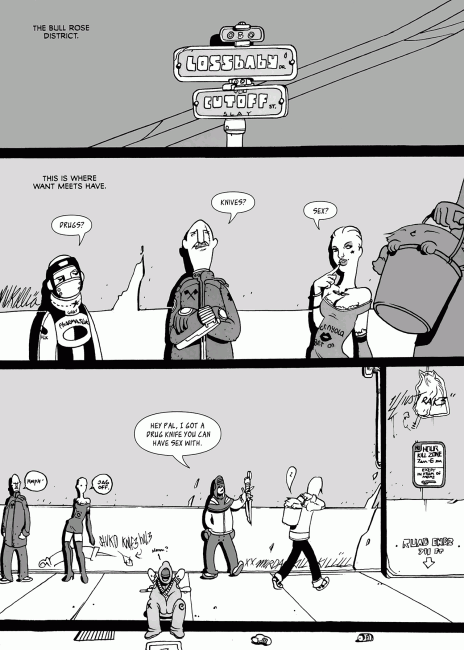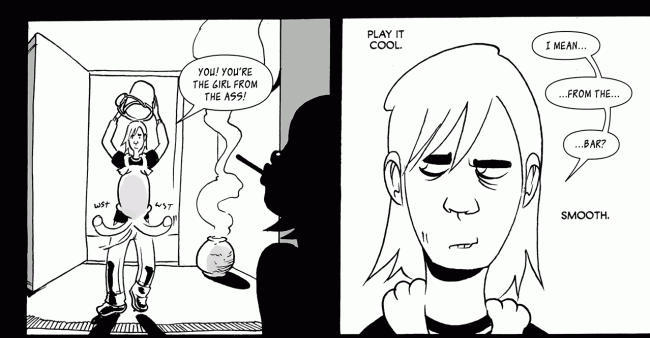


12 Days of Brandon Graham’s King City: Day 7
December 19th, 2010 Posted by david brothersWhat I like about Joe is that he’s not some super heroic guy out to do what’s right. He’s not Captain America. He’s a regular fella who has a good idea of right and wrong, and works toward that, but he’s also a guy who can’t resist a big butt and a smile, for better or for worse. He gets distracted and thinks about sex in a way a lot of comic characters don’t.
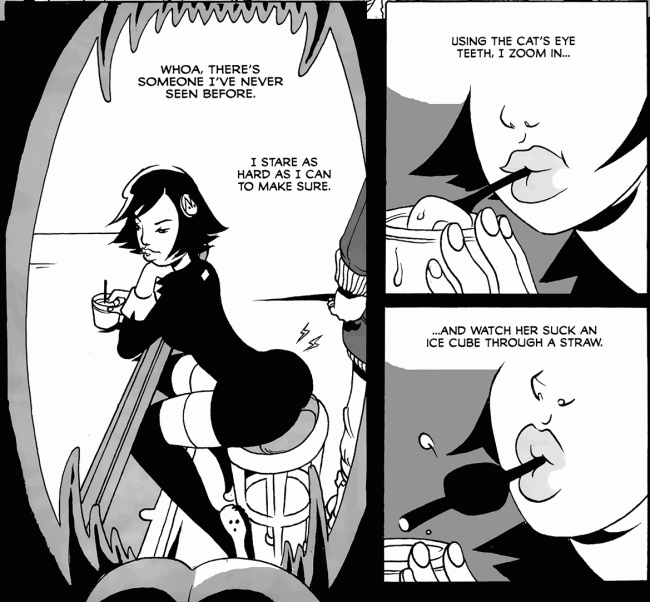

12 Days of Brandon Graham’s King City: Day 6
December 18th, 2010 Posted by david brothers
12 Days of Brandon Graham’s King City: Day 5
December 17th, 2010 Posted by david brothersReal life is awkward. I was at the movies the other day and waiting on a friend. He was going to show up late, so I was keeping an eye out. I saw someone who I thought was him walk in, so I waved him over. He waved back and came to sit down. When he got about a seat away, we both realized that we didn’t know each other at all. He sat one seat down from me and we both quietly decided not to acknowledge what happened.
Basically, mere seconds after you do something cool like a cat flip? You’re going to do something perfectly normal and awkward like float down a hallway. You can’t have the awesome without the mundane.
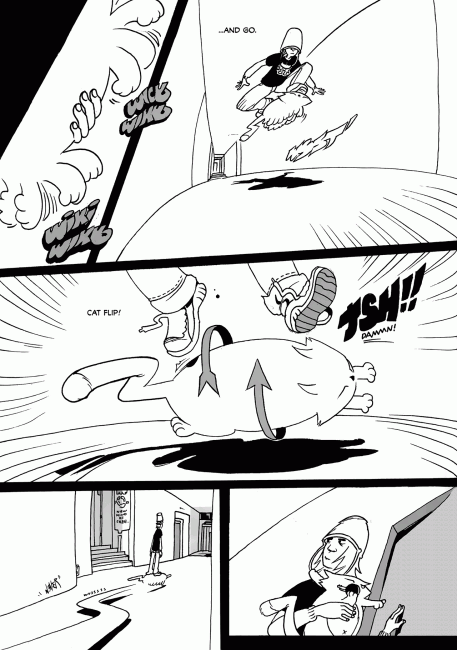

12 Days of Brandon Graham’s King City: Day 4
December 16th, 2010 Posted by david brothersHow often do people eat in comics? According to my friend Chris, not often enough. I agree. So much of our entertainment is geared toward big things happening, whether explosions or laser eyes, that we miss the small things that make the big things matter. Case in point: Joe is about to do something, so he eats. What do you do in real life before doing things? You eat.
And dig that “no stabbing” sign.
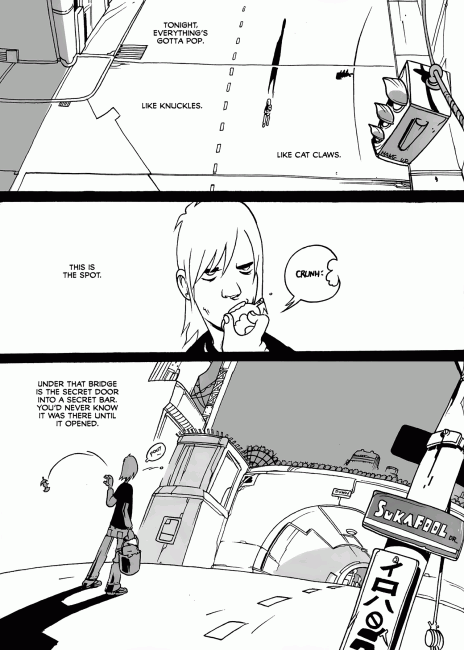

12 Days of Brandon Graham’s King City: Day 3
December 15th, 2010 Posted by david brothersYou ever have somebody you can talk to freely? That kind of free wheeling, free association, talking just to talk and maybe be a little clever sort of thing? Where you can have a conversation where you’re both saying a lot of nothing, but it’s still time well spent? Graham is really good at writing those conversations.
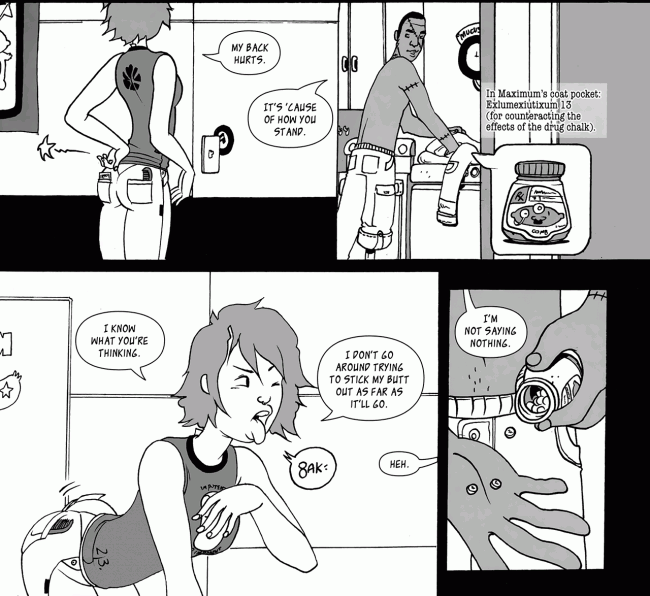

12 Days of Brandon Graham’s King City: Day 2
December 14th, 2010 Posted by david brothersI said I wasn’t gonna talk, but I changed my mind.
A lot of the power of King City comes from the fact that Graham is writing about relationships. Everybody has them. This one is about Joe and Earthling, his cat. Have you ever had pets? Then you’ll understand their relationship. There’s a definite childbirth subtext here, too, isn’t there? Introducing a new father to his child.
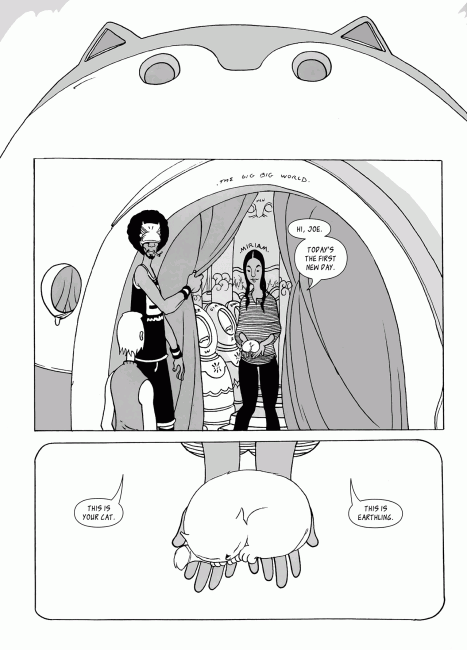

12 Days of Brandon Graham’s King City: Day 1
December 13th, 2010 Posted by david brothersBrandon Graham’s King City is one of my favorite comics this year. Over the next twelve days, at noon even, I’m going to show you a reason why. KC speaks for itself pretty well, and if you have to know how I feel about it, I wrote about it here. I could fill these up with blather, but just read that and reread it every time I post an image.
Ask your comic shop guy nicely and he might be able to get all twelve issues for you. If you don’t like them, well… sucks to be you.
Now, with that out of the way, let’s all make out in the comments!
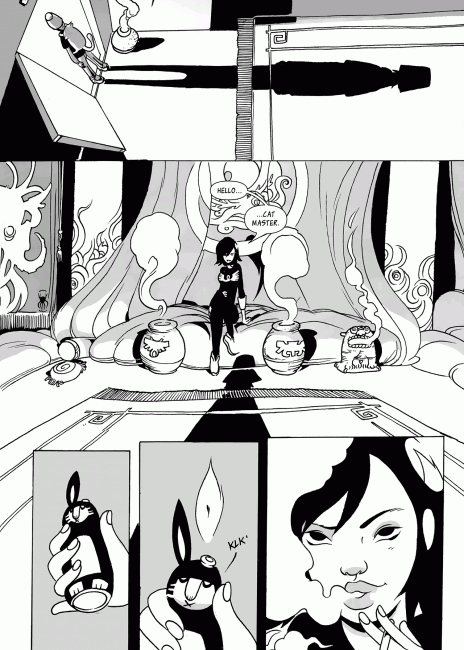

2 Kings: Vagabond
August 10th, 2010 Posted by david brothers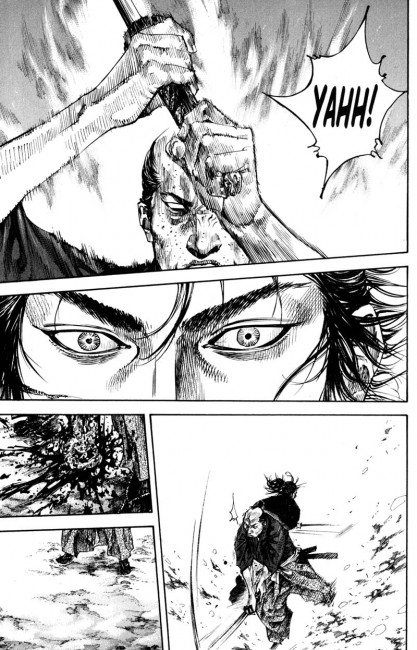
Let me show you the strength of serialized comics.
I don’t mean the usual idea of serialized comics, either. X-Men and Superman are serialized, but they have very short term goals in mind. They aren’t one story, except in the most generous of definitions. I’m talking about one story, released in parts, with each chapter being a vital part of the overall story.
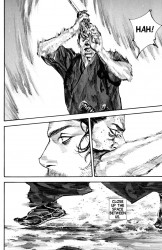
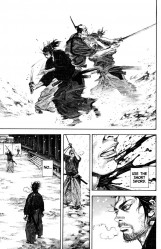
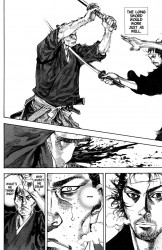
Takehiko Inoue’s Vagabond is a loose adaptation of Eiji Yoshikawa’s Musashi. I could talk about the writing (it’s fantastic) or the art (styles upon styles upon styles is what he has), but I’d rather talk about chapter 215 in Vizbig 8
/Volume 24
.
At the beginning of the story, Miyamoto Musashi is Shinmen Takezo. He grew up under the thumb of a cruel father, and the villagers called him a demon child. He grew up to become just that–a whirlwind of death and violence on the battlefield. He goes off to war and comes back even worse. He decides that he must become Invincible Under the Heavens, and goes out in search of challenges.
He topples everyone he encounters. He eventually runs afoul of the Yoshioka family at one point. They’re one of the most respected sword families, and by challenging them as he did, Musashi disrespected them. His fight with Yoshioka Denshichiro is cut short by a spectacularly poorly-timed fire, and he is challenged to duel him again one year in the future. Den and Musashi are both going to use the time to train and prepare for their battle.
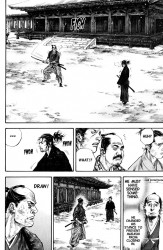
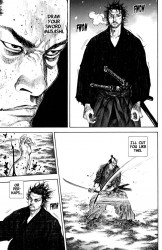
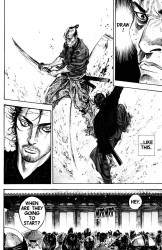
Musashi walks around Japan, looking for challenges and attempting to get better. He destroys all comers, but that isn’t the point of the quest. He has to get better, and getting better doesn’t necessarily mean being the best at swinging a sword. He has to have the poise, experience, and knowledge worthy of a true swordsman.
He meets Sekishusai, one of the greatest swordsmen of the past, and attempts to kill the old man in his sleep. The man’s very presence stops Musashi cold, and their brief conversation completely demolishes Musashi’s idea of skill. He realizes that “invincible” is just a word, and that he has mountains left to climb before he’s as good as he will be.
The challenge was given in what, volume four? Very early on, and in the second Vizbig volume. It’s hard to keep track when you’re reading this series three volumes at a time in the Vizbigs. The second duel begins in the eighth Vizbig volume, 20 normal volumes later. That’s some four thousand pages of story between the challenge and the duel, and we have seen Musashi go through a lot. His idea of swordsman ship has broken down and been rebuilt. He has healed an enemy rather than killing him. He understands what’s worth dying for now. Immediately previous to the duel, he remembered how he approached life as a child, a period of time he spent learning from nature itself. He understands exactly how lucky he has been to survive this long.
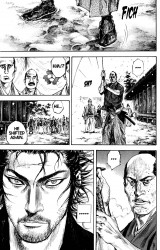
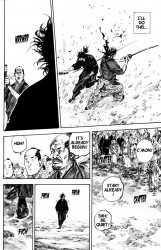
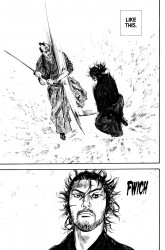
So we have this man, this monster, ready to duel one of the most respected swordsmen in the land. If he beats him, the school’s reputation is ruined. Musashi has a reputation for being wild and violent, but he’s different now. Everyone can see it. They mistake his different nature for a lack of respect and pure over-confidence. Den draws his sword and takes a strong stance.
Musashi begins walking forward.
Scenarios play out across the page. Den and Musashi cross swords and Den’s intestines hit the ground. Except–no, they haven’t met yet. Musashi is still walking. There’s at least fifteen feet between them.
Musashi keeps walking. He begins running through possible encounters in his head. “Use the short sword,” he thinks, and his mind’s eye shows him Den’s throat opening under his blade. “No,” he thinks. “The long sword would work just as well.” Den’s throat opens again.
Den changes his stance. He positions himself so that Musashi cannot rush in. He doesn’t know what’s in Musashi’s mind, but something made him change. Meanwhile, Musashi is still running down scenarios. Den’s hands fall away from his arms after one swing. Another swing takes Den’s left leg around the knee.
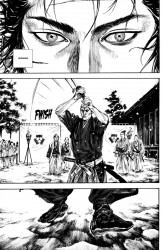
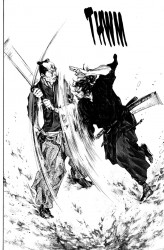
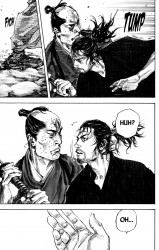
Den’s stance changes again. Musashi is still thinking. A quick slice across the throat. One down the middle, leaving a gash from shoulder to crotch that severs Den’s entire left forearm.
Another stance change.
Musashi kicks off and into Den’s personal space with a fast swing. Den is caught by surprise and flinches, his sword tilting backward and his entire front side left open. Musashi’s body hits Den’s just before his foot touches the ground after his small step. He looks up. Den’s face is strained, but unbloodied. Musashi looks down at his hand.
No sword.
Den shoves him back, knocking him up a set of stairs, and rushes in with an overhead swing. He misses.
Musashi: “No wonder my hands felt so light.” He says, “My mistake,” and finally draws his sword. He steps down from the temple steps and towards Den again. And the duel that has been four thousand pages in the making finally begins.
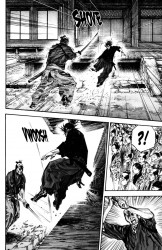
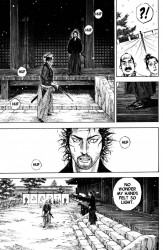
I read this story on my way back from San Diego Comic-con this year. It fell on me like a ton of bricks. Musashi’s growth had been so gradual over the course of the series, coming in fits and starts and never quite spelled out for us, that I missed exactly how much he’d grown. Musashi began as a demon, charging face first into battle and focused only on winning and killing. He had skill, and he had style, but he was like a raw, uncut diamond. He got the job done, but he was ugly and unrefined. He bled killing intent all over the place, striking fear into peasants and making an enemy of every man he met. He was young and brash, and focused merely on being the best.
His year walking around taught him that before being the best, you must first become the best. You have to meditate and learn before you can be the best. There is a process. You have to test yourself and your sword. You have to understand that your sword is an extension of your will and be willing to give yourself over entirely to the sword at the same time. It is a way of life, not some mere accomplishment. Being Invincible Under The Sun means nothing if you aren’t worthy of that title.
And in this chapter, all of that backstory reappeared as weight on my shoulders. Like an overnight sensation who has been working at it for five years, Musashi demonstrated the amazing leap he has made in his swordsmanship. Before, he was a monster. Now, he’s good. He takes Den apart tactically, and the sheer force of his silent contemplation forces Den to adjust his stance and defend. Musashi showed no outward sign of his plans at all. He simply kept walking forward.
He beat Den without a sword in his hand.
The sheer level of growth here is astounding, and the way Inoue demonstrated Musashi’s growth is even more astounding. There’s no exposition, no onlookers explaining what’s going on, or captions filling you in. Den recognizes Musashi’s quiet strength, but everyone else is left in the dark. This is a tremendous payoff, and part of the reason why it’s so tremendous is that you don’t see it coming. You know Musashi’s better. You’ve seen the bloodied bodies he’s left in his wake. You’ve seen him have a play duel with the man who’ll soon be his greatest rival. But when he faces Den, so lost in the battle that he doesn’t even draw his weapon, and still comes through, that’s the moment.
After I finished this chapter, I felt tense. It snuck up on me as I was reading. My brain was working as I read, and when I realized Musashi didn’t draw his blade before striking, I felt genuine shock.
Comic books, man. Sometimes they’re amazing. Vagabond and King City. Brandon Graham and Takehiko Inoue. Their books are good for similar reasons (strong, character-focused storytelling, great art, great world-building) and good for different reasons (Inoue flips styles regularly and prides himself on realism, Graham plays with puns and layouts). Both of them, though, are the kind of books that make you believe in comics. They’re refreshing, they’ve got the kind of punch that comes from telling one story, and they’re just good. They’re the kind of good that’s free of caveats. There’s just one man and his tools, and the result is something beautiful.
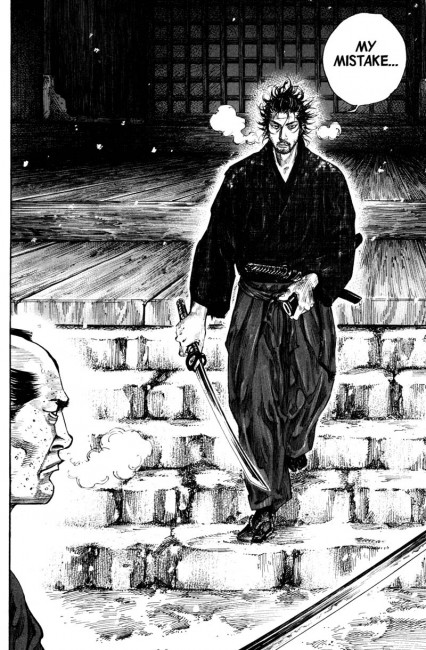

2 Kings: King City
August 10th, 2010 Posted by david brothers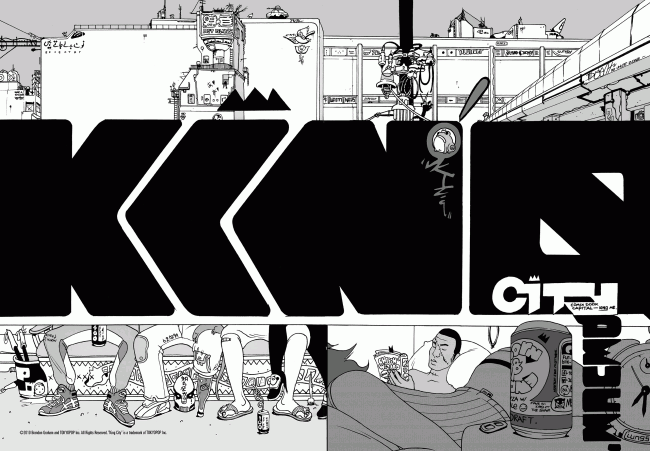
(Some of the images in this one might be too sexy for work. If so, you should fire your boss and become a boss yourself.)
Reading Brandon Graham’s King City also sparks two thoughts in my mind. The first is “Wow, this comic is fantastic.” The second is, “Wow, that comic made all these other comics I bought this week look stupid.”
The thing about King City is that it’s a dense comic. I don’t mean dense in the sense of the opposite of decompression, if people still complain about that. I mean dense in the sense that there’s a lot to take in, if you just take the time to do so. The book is littered with puns, little bits of cleverness, and swift turns of phrase. They can be as simple as Optimus Prime Roast or a girl obsessed with painting mustaches on billboards, or brief phrases layered with meaning.
King City isn’t really about anything. I mean, sure, there’s a hero and his cat (Joe and Earthling), the femme fatale (Beebay, and in the classic sense of the term, a woman who leads men to their doom), the ex-girlfriend (Anna), the best friend (Pete), and a big fat world-ending menace. At some point, Joe and Earthling are going to have to handle the threat, but King City isn’t about that. Graham will handle that when he has to. In the interim, he’s just going to hit you with the life and times of the cast.
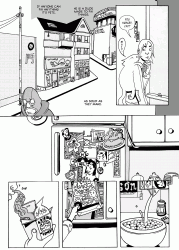
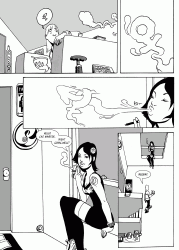
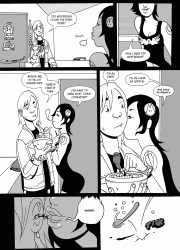
I don’t mind that approach one bit, because Graham’s shifted focus genuinely pays off. Every single page has something hidden or in plain sight that’s worthy of examination. One of my favorite scenes in the comic is the semi-sex scene at the end of issue seven. The scene skips from solicitation to post-coital between panels, like a jump cut in a movie. That is worthy of examination in and of itself, but what I like the best about this scene are just seven short words.
Joe, looking at Beebay, says, “This thing with Beebay is weird. Sometimes her cigarette smoke smells like flowers. Beebay is weird.” That’s one of those things that make you pause and rewind a bit just so you can read it again. I definitely did it, and it managed to get stuck in my head for several weeks. It’s an expression of that screwed up kind of attraction that you fall into by accident, where someone can simultaneously do no wrong and is still not to be trusted. It’s too right, and it’s so good that something must be up. There’s a catch, there’s a trick, there’s something going on that isn’t right. Have you ever felt that?
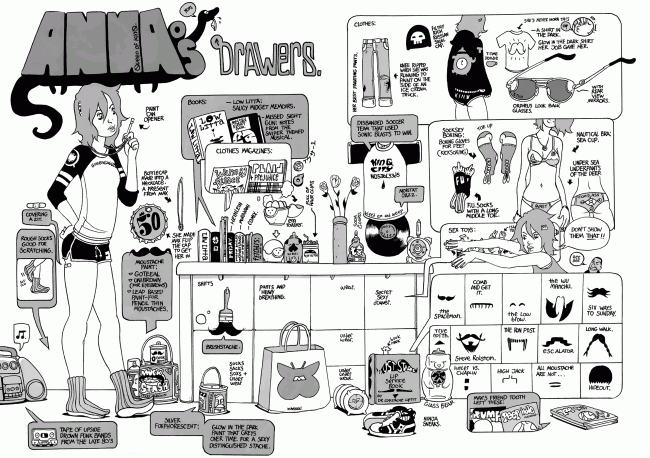
And I mean, that’s just one page. You can get the depth of Joe’s desire and distrust right there. Two pages later, Graham spells it out for you with another pun and a pointed remark. Beebay has a big butt, and as she walks away, Joe thinks, “Child burying hips.” As she pulls on her stockings, he thinks, “She’s a fucking snake pit though.” Desire and distrust, all wrapped up in one easy to understand package.
Two pages, two hundred words. I could go on and on about this segment of the book (the way that Beebay “leaves my room full of empty” when she leaves, the heart-on joke, the trail of clothes leading to the bed with the impeccable cereal bowl, the way whispers the word “ssex” into Joe’s ear like an old Bugs Bunny cartoon, or the Mars penetrating the Venus), but this is just spring boarding off one small scene. There’s so much to enjoy about King City. I could sit down with every issue of King City and find one sequence worth talking about at length, and then do it again and again and again. There’s depth here, and it’s fantastic.
Another thing. One thing cape comics have been doing that blows my mind, and not in a good way, is wasting double page spreads on exposition and talking heads. Who wants to see John Romita Jr draw twenty-odd headshots of people saying “Yes” or “No” to Captain America? That’s wasted page space. In King City, the spreads are used for things with actual impact, like when the big bad monster happens across Anna, or to build mood and set the stage, as in the amazing spreads that just show the kingcityscape. These are punches. Talking heads aren’t even little kid bops.
I don’t read King City when I read what few remaining weekly books I still pick up. King City overshadows them, making them look lazy in comparison. There are books that I dig quite a bit that end up looking like pointless water-treading when you read them before or after reading King City. I usually save King City for the weekend, when I can relax on the couch, read it, take a nap, wake up, and read it again. I consume King City. It’s like the difference between a fast food burger and one you make yourself. One will fill your stomach. The other will make you feel good.
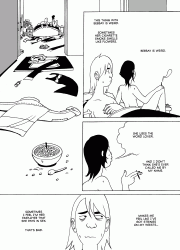
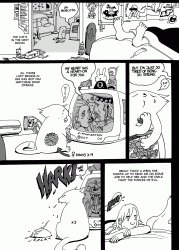
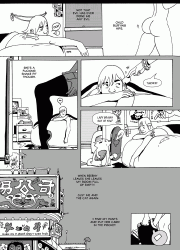
When’s the last time you read something in Justice League or Avengers that resonated as strongly as “Sometimes her cigarette smoke smells like flowers?” Is there any reason why those books shouldn’t resonate, shouldn’t be as personal, as King City? Once you experience something nice, you don’t want to go back to what you had before. No one wants to go back to wearing buttercookies after trying on a nice pair of Air Force 1s. No one wants to drive a Volvo after getting behind the wheel of a Cadillac. King City is like that. It’s enormously creative, clearly a work of love, and the sort of eating that sticks to your ribs.
How can you go back to other comics after that? King City has been a big factor in my slow retreat from corporate comics over the past year. I need to keep upping the ante, and while I’ve found several books that live up to the new standard, a lot have been left by the wayside. No, let me rephrase the question.
Why should I go back to other comics after that?
Brandon Graham, man. He’s making everybody else look bad.
